Woman Refuses To Take Husband's Dog Everywhere Because She Thinks It’s Instigating Separation Anxiety, Husband Disagrees And Threatens With Divorce
Dogs are such amazing creatures. They will never let us down, they will always be at our side.
But some dogs need to constantly be by our side. Their love is unconditional, and that’s the reason we love dogs so much.
But sometimes their need to be with us constantly is simply overwhelming. Dogs are beautiful and amazing but we can’t take them everywhere all the time.
It’s simply not realistic. And that creates a problem, especially since a lot of dogs developed separation anxiety due to the pandemic and lockdown.
One Redditor shared her problem. Her husband's dog has developed some separation anxiety issues.
Her husband is enabling the dog and only making it worse. He wants OP to behave in the same way, and she won't do it.
She told him she was not taking the dog with her on one of her errand runs. He still insisted. They had a fight and she hung up on him.
Well, after a while, he came to pick up the dog and take her to work with him. The levels of drama are pretty high here...
And he decided to take them even higher by saying how "he can't believe how insensitive I am becoming and asked how I would feel if I was purposely left out for no good reason and then proceeded to tell me that this is very possibly a deal breaker for him because of how much of a hassle I'm making it."
A deal breaker? Was he talking about divorce?
Read the interesting story below:
OP asks:

Her husband's dog has developed some separation anxiety issues
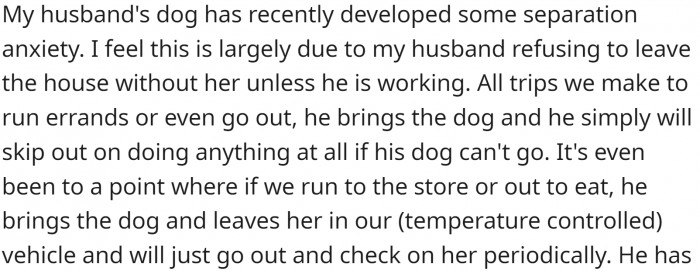
Her husband is enabling the dog and only making it worse

Understanding Separation Anxiety in Pets
The woman's concern about the emotional effects of taking her husband's dog everywhere reflects a deeper understanding of separation anxiety in pets. Research in veterinary behavior emphasizes that pets can develop anxiety when faced with constant changes in their environment or routine. According to Dr. Esther Perel, a renowned couples therapist, "Pets are often sensitive to the emotional dynamics of their owners, and disruptions in routine can create anxiety for both parties." Furthermore, Dr. Dan Siegel, a leading child psychiatrist, states, "Just like children, animals can experience significant emotional distress when their environment shifts unexpectedly." These insights highlight the importance of maintaining a stable routine for both pets and their owners.
Understanding Separation Anxiety in Pets
The woman's concern about her husband's dog instigating separation anxiety highlights the psychological complexities surrounding pet ownership. Research in animal behavior psychology indicates that many pets can experience separation anxiety, leading to distress when their owners are away.
According to studies published in the Journal of Veterinary Behavior, separation anxiety in dogs can manifest in various ways, including destructive behavior and excessive barking.
This situation emphasizes the importance of addressing behavioral issues to ensure a harmonious living environment.
He wants OP to behave in the same way, and she won't do it

She told him she was not taking the dog with her on one of her errand runs

Her husband still insisted

This situation highlights the importance of recognizing the emotional needs of pets and their owners. A clinical psychologist notes that understanding the signs of separation anxiety can help pet owners make informed decisions about their pets' well-being and emotional health.
Engaging in open conversations about the dog's needs can foster empathy and cooperation in addressing these concerns.
Understanding the underlying causes of separation anxiety is crucial for effective management. A study by Dr. John Paul Scott highlights that many dogs develop these behaviors due to past experiences of abandonment or inconsistent caregiving.
Addressing these root causes can lead to more effective interventions and reduce anxiety in pets.
They had a fight over it

So, he came back to pick up the dog and take her to work.

"People need to chill with the dog-obsession"

Coping with Separation Anxiety in Pets
Coping with separation anxiety in pets requires a combination of understanding and proactive strategies. Research suggests that gradual desensitization techniques can help pets adjust to being alone, reducing anxiety over time. According to Dr. William Doherty, family therapist, "Gradual exposure to alone time can help pets learn that being alone is safe and not a cause for concern." He emphasizes that creating a comfortable environment is crucial for this process. Additionally, Dr. Josh Axe, chiropractor and wellness expert, notes that "Providing a safe space with familiar items can significantly ease a pet's anxiety during these transitions." Together, these strategies can foster a healthier emotional state for pets facing separation.
The Role of Communication in Relationship Dynamics
This situation underscores the importance of communication between partners regarding pet care and emotional health. Research indicates that couples who practice open dialogue about their concerns are more likely to achieve mutual understanding and satisfaction.
In this case, discussing the husband's perception of the dog's behavior can help the wife understand the emotional significance of the pet for him.
Effective communication can lead to collaborative solutions that respect both partners' feelings.

"It's gotten out of hand."

This true
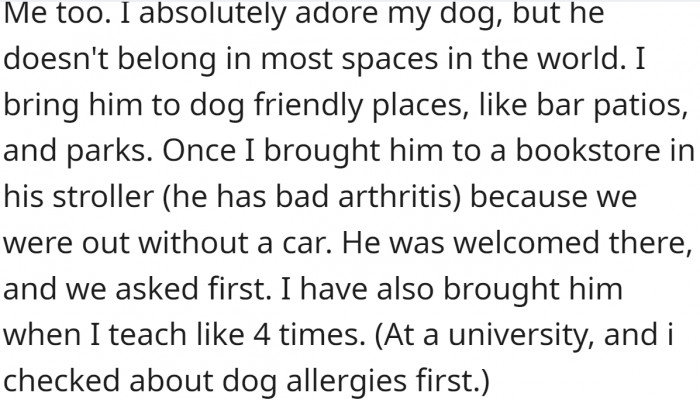
To implement these techniques, pet owners can start by leaving their pets alone for short periods and gradually extending the duration as the pet becomes more comfortable. Providing engaging toys and creating a safe space can help alleviate anxiety during these transitions.
Additionally, establishing a consistent routine can provide pets with a sense of security and predictability, further reducing anxiety levels.
To address the issue effectively, the couple could engage in discussions about managing the dog's anxiety. Techniques such as gradual desensitization and positive reinforcement can be employed to help the dog feel more secure when left alone.
Research indicates that these methods are effective in reducing anxiety and improving overall behavior in dogs.
"It's such an entitlement thing now..."

"Some individuals are definitely humanizing animals to a point of no return"
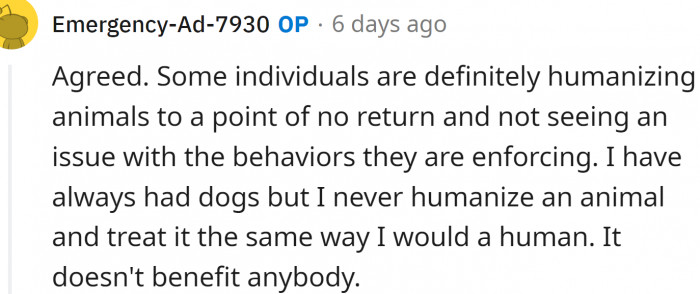
This is so common:

The Role of Boundaries in Pet Ownership
The woman's decision to limit the dog's outings reflects the importance of setting boundaries in pet ownership. A social psychologist emphasizes that boundaries can help maintain balance and harmony in relationships, especially when it comes to shared responsibilities.
Research indicates that couples who establish clear boundaries often report higher levels of satisfaction in their relationships.
Finding Compromise in Relationships
Compromise is essential for navigating conflicts in relationships, particularly when it comes to pet care. Studies show that couples who practice effective compromise tend to experience greater relationship satisfaction.
In this situation, exploring ways to manage the dog's presence in a manner that feels comfortable for both partners can foster collaboration, such as discussing strategies to support the dog's emotional needs without overwhelming the wife.
This Redditor says:
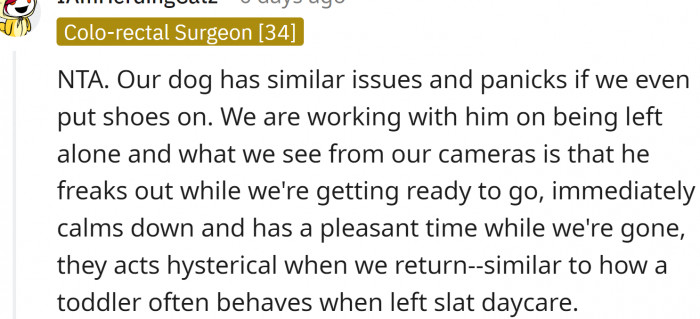
OP's husband is actively promoting and encouraging the separation anxiety.

This is a good advice:

To foster healthy boundaries, couples can engage in discussions about their expectations and responsibilities regarding pet care. Creating agreements around the dog's presence in various settings can help both partners feel comfortable and respected.
Moreover, regularly revisiting these boundaries can ensure they adapt to changing circumstances and needs.
Additionally, seeking professional guidance through pet training or couples counseling can provide valuable tools for navigating these conflicts. Research indicates that couples who engage in therapy often develop better communication skills and a deeper understanding of each other's perspectives.
Working with a professional can help the couple explore their feelings about the dog and develop strategies for compromise.
We can’t take our dogs everywhere all the time.

Her husband is being incredibly dramatic.

Dogs are not welcome everywhere
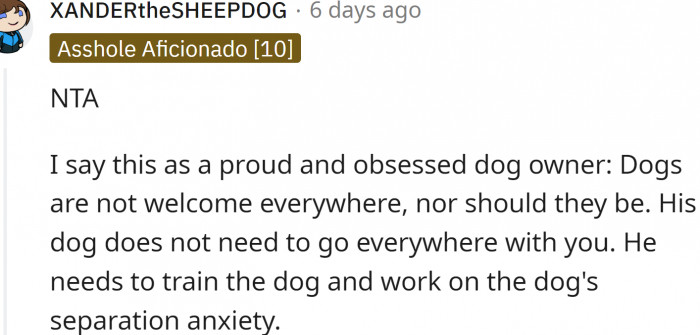
The Emotional Connection Between Owners and Pets
The bond between pets and their owners is often characterized by deep emotional connections. Research shows that pets can provide significant emotional support, helping to reduce feelings of loneliness and anxiety.
According to studies published in the Journal of Clinical Psychology, the presence of pets can enhance life satisfaction and overall well-being.
The Importance of Emotional Support in Relationships
This situation illustrates the critical role emotional support plays in relationships, especially when pets are involved. Research indicates that emotional support animals can significantly enhance well-being and provide comfort during stressful times.
Understanding the emotional significance of the dog for the husband can foster empathy and connection between partners.
By discussing these feelings openly, they can strengthen their bond and work towards a resolution.
OP’s husband is actively promoting and encouraging separation anxiety by taking the dog with him everywhere. Furthermore, it seems that he is also promoting his own separation anxiety.
Being so worried about the dog that you have to check up on it so often… Well, doesn’t sound very reasonable, does it?
He really needs to listen to his wife. She is the voice of reason in this story.
Her actions make much more sense than his.
Ultimately, the couple's ability to communicate openly about their needs and feelings will determine how they navigate this situation. By prioritizing understanding and compromise, they can find solutions that honor both partners' emotional health and strengthen their relationship.
Regular check-ins can help maintain an ongoing dialogue and foster a supportive partnership.
Psychological Analysis
This situation highlights the challenges of managing emotional needs within relationships, particularly when pets are involved. From a psychological perspective, fostering open communication and seeking compromise is vital for navigating conflicts surrounding emotional support animals.
Analysis generated by AI
Analysis & Alternative Approaches
In conclusion, navigating the complexities of separation anxiety in pets and the emotional needs of partners requires effective communication and understanding. By fostering open dialogue and empathy, this couple can address their differences effectively.
Ultimately, prioritizing compromise and emotional support can lead to healthier relationship dynamics and emotional well-being.
To nurture this bond, pet owners can engage in activities that foster connection, such as training, playtime, or simple companionship. These shared experiences can enhance the emotional ties between pets and their owners, promoting a sense of partnership and mutual understanding.
Recognizing the role pets play in emotional support can help partners appreciate their value while addressing any concerns that may arise.
Analysis & Alternative Approaches
In conclusion, navigating the complexities of living with a pet requires understanding the emotional needs of both the animal and the owners. By fostering open communication, setting boundaries, and recognizing the emotional support that pets provide, couples can enhance their relationships while ensuring mutual understanding and respect.
Ultimately, addressing these dynamics can lead to healthier partnerships and improved emotional well-being.



